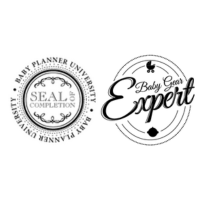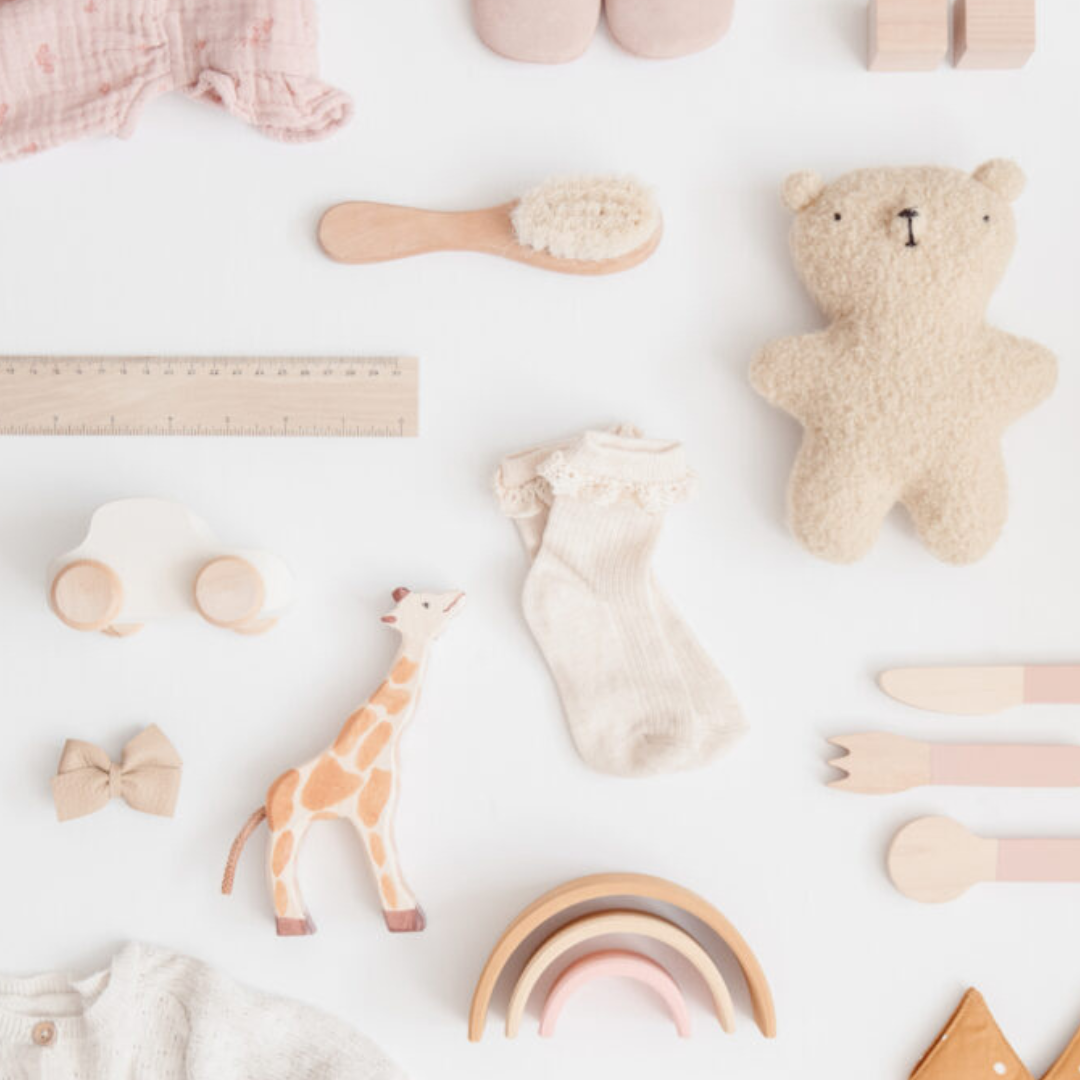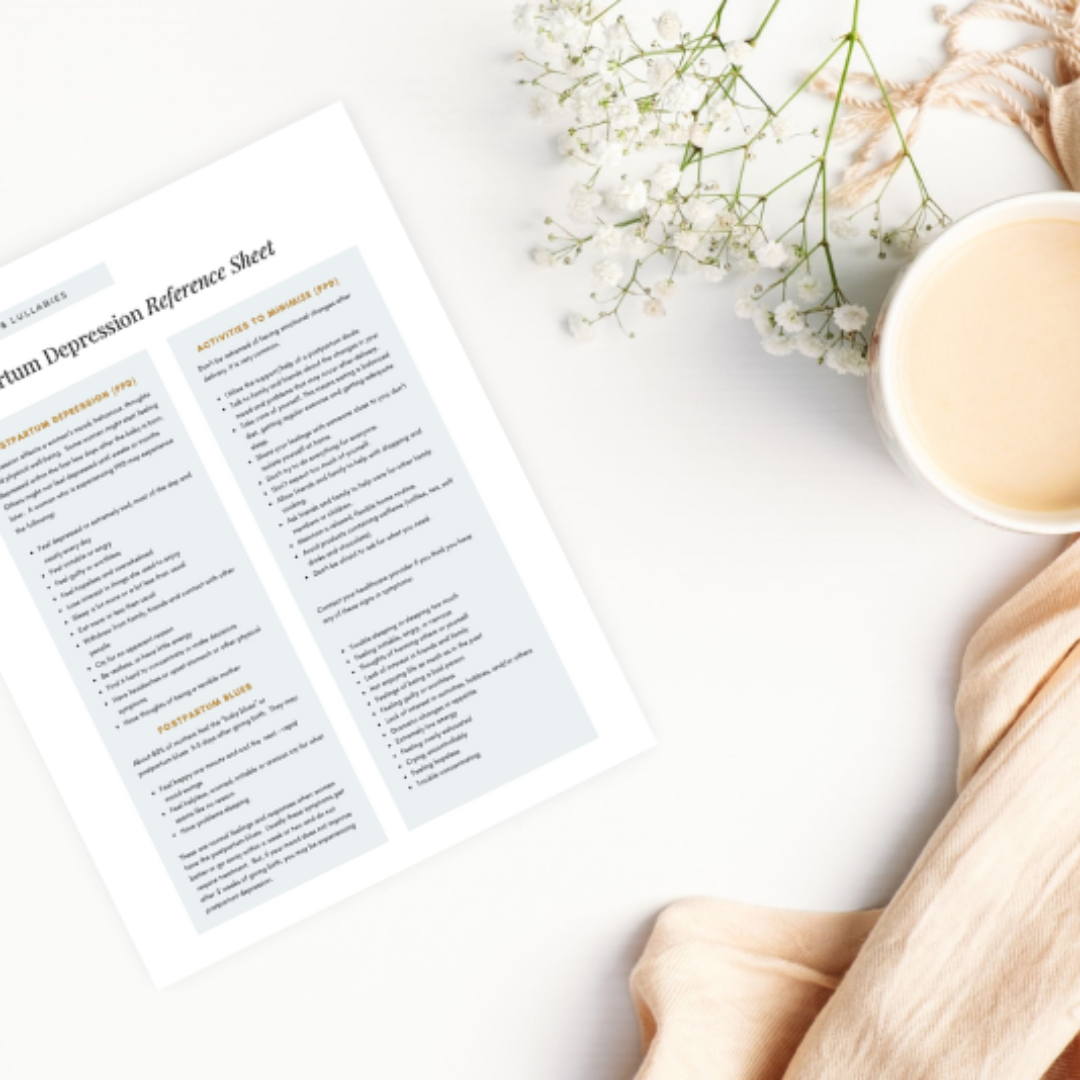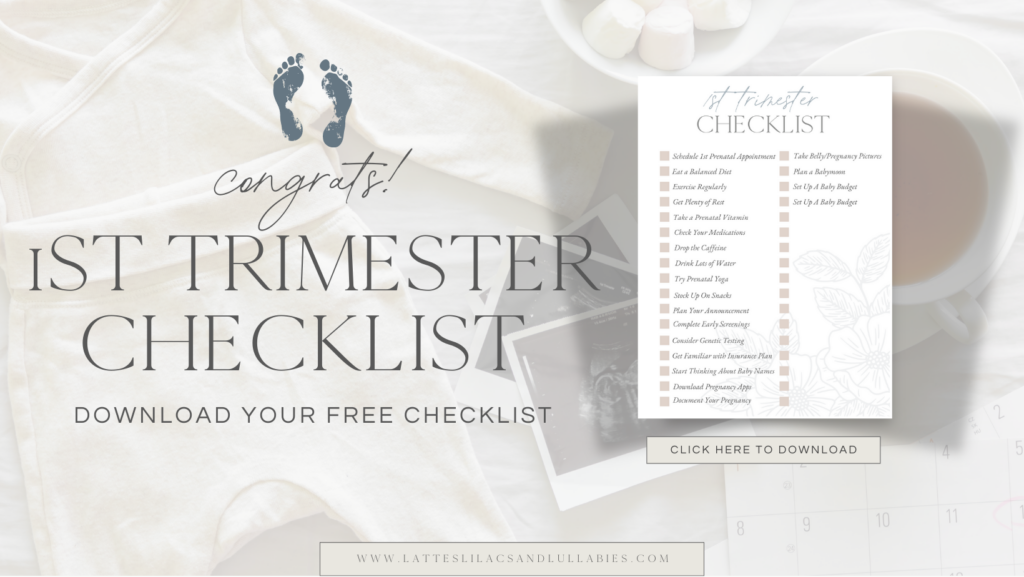
Congratulations, you’re pregnant! Now what? The first trimester can be a confusing time for new parents. There are so many things to do and remember! That’s why we’ve created this comprehensive checklist to help you know what to do in the first trimester.
This list will cover everything from prenatal care to what to avoid in those early days. So read on, and get ready for an amazing journey ahead!
{We are a participant in the Amazon Services LLC Associates Program, an affiliate advertising program designed to provide a means for us to earn fees by linking to Amazon.com and affiliated sites. To learn more about affiliate links, click here!}
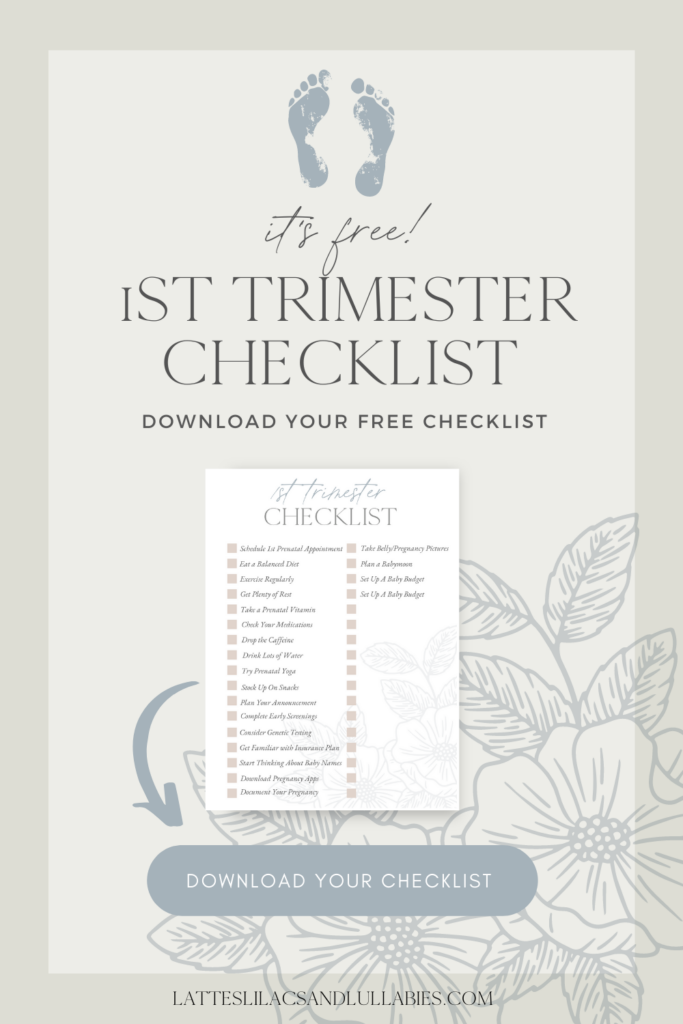
What Is The 1st Trimester & Why Is It Such An Important Time?
The first trimester of pregnancy is an exciting time that marks the beginning of many significant developments within the baby’s body. During this period, the baby’s major organs and bones are formed, and all of its body systems begin to function.
Furthermore, in the early stages of development, the baby undergoes a tremendous amount of growth. This rapid growth can sometimes lead to common symptoms like fatigue, exhaustion, mood swings, and morning sickness, which are some of the most widely experienced first trimester symptoms.
However, despite these challenges, this important stage in pregnancy lays the foundation for health and wellness throughout life. So if you are expecting a baby or know someone who is, be sure to take care during this crucial first trimester!
What Happens In The 1st Trimester: Baby
During the first trimester of pregnancy, a lot is happening both inside and outside of the mother’s body. At this early stage, the brain and spinal cord of the developing fetus are forming, as are all of its major organs. With each passing week, the pregnancy progresses and new hormones are released that help to support a healthy pregnancy.
Additionally, there is a heightened risk for birth defects during this critical period, which can be caused by environmental factors or genetic abnormalities.
Despite these risks, it is important to remember that most pregnancies progress smoothly during the first trimester, largely thanks to all of the wonderful changes that are taking place both physically and chemically. And with every passing day, we inch closer and closer to welcoming our little bundles of joy into the world!
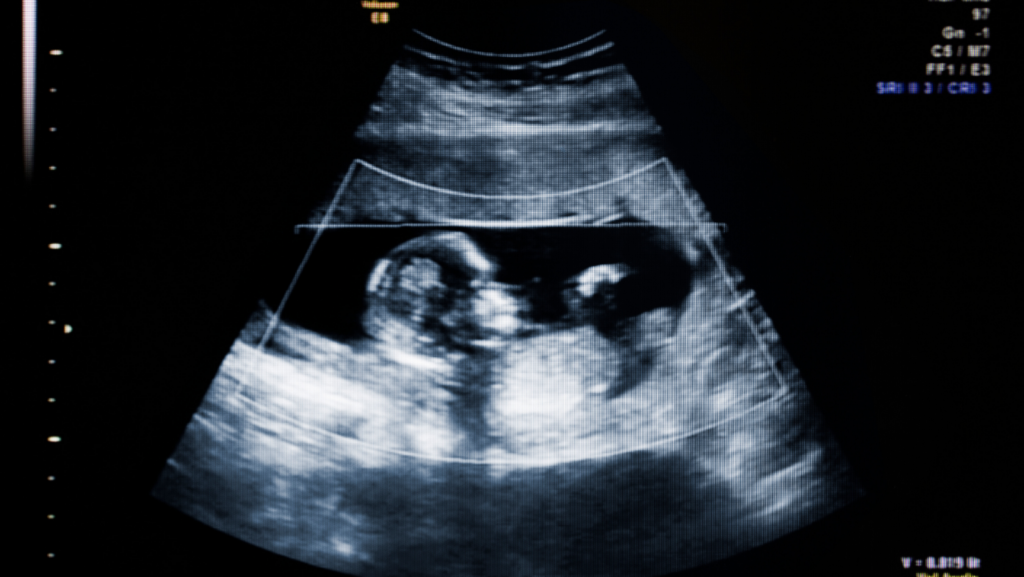
What Happens In The 1st Trimester: Mom
The first trimester is an incredibly busy time for your baby-to-be. Organs begin to form, the embryo implants in the uterine wall, and the amniotic sac begins to fill with fluid.
For you, there’s a significant rise in hormones, which can lead to fatigue, nausea, and breast tenderness. But don’t worry, this is all part of the process!
By the end of the first trimester, your little one will be about the size of a grapefruit. So take it easy, drink plenty of fluids, and get ready for an amazing journey.

The Do’s and Dont’s in the First Trimester
Now that we know what happens during the first trimester, let’s take a look at some of the things you should and shouldn’t do to ensure a healthy pregnancy.
What To Do In First Trimester of Pregnancy
When you find out that you are pregnant, it is important to take the proper steps to ensure a healthy and happy pregnancy. Some of the most important things to focus on early on in your first trimester are…
Schedule 1st Prenatal Appointment
One of the first things you should do when you find out you’re pregnant is schedule your first prenatal visit. This visit is important because it gives your healthcare provider a chance to assess any risk factors you may have and to start keeping track of your baby’s development.
Eat A Balanced Diet
Eating a balanced diet during the first trimester of pregnancy is essential for your baby’s development. During this time, your baby’s brain and nervous system are growing rapidly, and they need the right mix of nutrients to support this development. A lack of essential nutrients can lead to developmental problems. Additionally, a balanced diet helps to prevent birth defects and low birth weight.
Exercise Regularly
Pregnant women have enough to worry about without being told that they need to exercise regularly. However, the truth is that exercise can actually help to reduce many of the common discomforts of pregnancy, such as fatigue and back pain. Exercise can also help to improve your mood and energy levels, and it can even help to prevent some pregnancy complications.
Get Plenty of Rest
There’s no getting around it – pregnancy is exhausting. Even in the best of circumstances, pregnancy hormones can wreak havoc on your energy levels. But here’s the thing – getting enough rest is actually really important for both you and your baby.
When you’re well-rested, your body is better able to handle the physical demands of pregnancy. And when you’re feeling good, you’re also more likely to make healthy choices like eating nutritious food and getting regular exercise. So even though it can be tough to get enough shut-eye when you’re pregnant, it’s worth making the effort.
Take a Prenatal Vitamin
Any expecting mother will tell you that there are a million things to think about when you’re pregnant. From picking out the perfect name to stocking up on diapers, there’s a lot to do to get ready for a new baby. But one of the most important things you can do for your developing baby is to take a prenatal vitamin during the first trimester of pregnancy.
Folic acid is essential for the development of the neural tube, and folic acid supplements can help to prevent birth defects in the brain and spine. So if you’re pregnant, make sure to ask your doctor about taking a prenatal vitamin with folic acid. It could be one of the best decisions you ever make for your developing baby.
Check Your Medications
When you’re pregnant, it’s important to be extra careful about the medications you take. That’s because many medications can cross the placenta and reach the developing baby, which can pose a risk to the baby’s health. That’s why it’s important to double-check with your doctor before taking any medication, both prescribed and over-the-counter, during the first trimester of pregnancy.
Drop the Caffeine
For the first few months of pregnancy, it’s important to limit your intake of caffeine. That means no more than 200 milligrams a day, or about two cups of coffee. Caffeine can cross the placenta and increase your baby’s heart rate. Too much of it can lead to low birth weight or even miscarriage.
Drink Lots of Water
Pregnancy is a wonderful time full of new experiences. You’re growing a human being! It’s amazing. But it’s also exhausting, both physically and emotionally. And one of the things that can help you through those long nine months (besides decaf coffee and naps) is good old H2O.
Water helps your body absorb nutrients, eliminates toxins, and prevents constipation. It also helps to keep your skin hydrated, which can help prevent stretch marks. So drink up, mama.
Try Prenatal Yoga
Prenatal yoga is a great way to stay fit during pregnancy, and it has some additional benefits as well.
First of all, it can help to relieve some of the common discomforts of pregnancy such as nausea and fatigue.
Second, it can help to increase your energy levels and improve your circulation.
Third, it can help to strengthen your muscles and prepare your body for the demands of childbirth.
Fourth, it can help to promote relaxation and reduce stress levels.
Finally, it can be a great way to meet other expectant mothers and make new friends. So if you’re looking for a way to stay active during pregnancy, prenatal yoga is a great option.

Stock Up on Snacks
Pregnancy is a beautiful time in a woman’s life. It’s a time when your body is growing and changing to accommodate a new life. It’s also a time when you may be dealing with morning sickness.
Morning sickness can be tough to deal with, but one way to make it easier is to have snacks on hand at all times. That way, when nausea strikes, you can just grab a snack and go.
Here are some reasons why it’s a great idea to stock up on snacks during the first trimester of pregnancy:
1. You never know when nausea will hit.
2. Snacks can help to settle your stomach.
3. Having snacks on hand will help you avoid quick, unhealthy meals.
4. You can always share your snacks with other pregnant women who may be experiencing morning sickness as well.
So, if you’re pregnant and dealing with morning sickness, make sure to stock up on snacks. It’ll make things a lot easier for you in the long run.
Plan Your Pregnancy Announcement
Pregnancy is an exciting time for any woman, full of anticipation and hope for the future. But it can also be a time of anxiety and stress, as couples grapple with the reality of becoming parents. One of the biggest decisions that expectant parents face is when to tell their family and friends about the pregnancy.
Some couples prefer to wait until the second or third trimester after the risk of miscarriage has passed. Others want to share the news as soon as they find out, eager to start sharing their joy with the people they love. There’s no right or wrong answer.
Complete Early Pregnancy Screenings
Completing early pregnancy screenings during the first trimester of pregnancy is extremely important. By doing so, you can ensure that your baby is developing normally and that there are no issues that could cause problems later on.
Additionally, early pregnancy screenings can help to identify any potential health risks to either you or your baby. And, of course, it’s always better to be safe than sorry.
So if you’re pregnant, be sure to schedule an appointment with your doctor for an early pregnancy screening. It could be the best decision you ever make.
Consider Genetic Testing
Expecting parents have a lot to think about – from deciding on a name to stocking up on supplies. But one of the most important decisions they will make is whether or not to have genetic testing. Genetic testing can provide valuable information about the health of both the mother and the child. It can also help to identify any potential risks for genetic disorders.
For these reasons, it is important to consider genetic testing during the first trimester of pregnancy. With early detection, parents can make informed decisions about their pregnancy and their baby’s health. So, while expecting parents have a lot to think about, genetic testing should be at the top of their list.
Get Familiar With Your Health Insurance Plan
It’s no secret that pregnancy is an expensive endeavor. Between the cost of prenatal care, hospital bills, and time off from work, expectant parents can quickly find themselves in over their heads financially. And that’s before you even factor in the cost of a baby crib, stroller, and all the other gear you’ll need to welcome your little one into the world.
One way to help offset some of the costs associated with pregnancy is to get familiar with your health insurance plan. Most plans will cover at least some of the expenses related to prenatal care and delivery, so it’s important to understand what your policy covers. This way you can make sure you’re taking advantage of all the benefits available to you and budget accordingly.
Of course, every insurance plan is different, so be sure to read the fine print and contact your insurer with any questions you may have. But getting acquainted with your coverage early on in your pregnancy can help ensure a smooth (and less expensive) experience for both you and your new bundle of joy.
Start Thinking About Baby Names
The first trimester of pregnancy is an exciting time. Not only are you getting used to the idea of becoming a parent, but you’re also beginning to bond with your little one.
And although it may seem like there’s plenty of time to choose a name, the truth is that the sooner you start thinking about baby names, the better. After all, there’s a lot to consider. Do you want a traditional name or something more unique? Should you choose a name that’s meaningful or simply pick something you like?
The list goes on and on. By beginning to think about baby names during the first trimester, you can give yourself plenty of time to mull over your options and find the perfect name for your bundle of joy.
Download Pregnancy Apps
There are a number of great pregnancy apps available that can help to track your progress and provide information on what to expect. Pregnancy apps can be a tremendous help during the first trimester of pregnancy.
For one thing, they can help you keep track of pregnancy week by week, so you know what to expect and when. They can also help you track your baby’s growth and development, so you can be sure everything is on track.
Plus, pregnancy apps can provide a lot of useful information and resources that can help you through the pregnancy process. So if you’re pregnant, be sure to download a pregnancy app or two!
Start Documenting Your First Trimester Journey
Some great ways to document your first-trimester journey include keeping a pregnancy journal, taking belly pictures, and sharing your story with friends and family.
A pregnancy journal is a great way to document your thoughts, feelings, and experiences during the first trimester of pregnancy. It’s also a nice way to look back on your pregnancy and remember all the details (both big and small) that made it special.

Take Photos of Your Baby Bump
As your belly grows, be sure to take lots of pictures! You’ll want to remember this special time. Taking belly pictures is another great way to document your first-trimester journey.
Not only is it fun to see how your body changes over the course of the pregnancy, but it’s also a great way to track your progress. And sharing your story with friends and family is a great way to connect with other expectant parents and get support during what can be a stressful time.
Plan A Babymoon
A babymoon is a great way to relax and bond with your partner before the baby arrives. Whether it’s a weekend getaway or a longer vacation, a babymoon is a great way to relax and bond with your partner before the baby arrives.
Set Up A Baby Budget
One of the joys of expecting a baby is shopping for all the cute clothes, toys, and gear they’ll need. It’s so easy to get carried away (pun intended) and blow your budget on baby things. That’s why it’s important to set up a baby budget during the first trimester of pregnancy.
By taking into account the cost of essentials like diapers, formula, and childcare, you can avoid financial stress down the road. And trust me, you have enough to worry about without money worries on top of it all. So put your feet up, relax, and let’s get started on that baby budget.
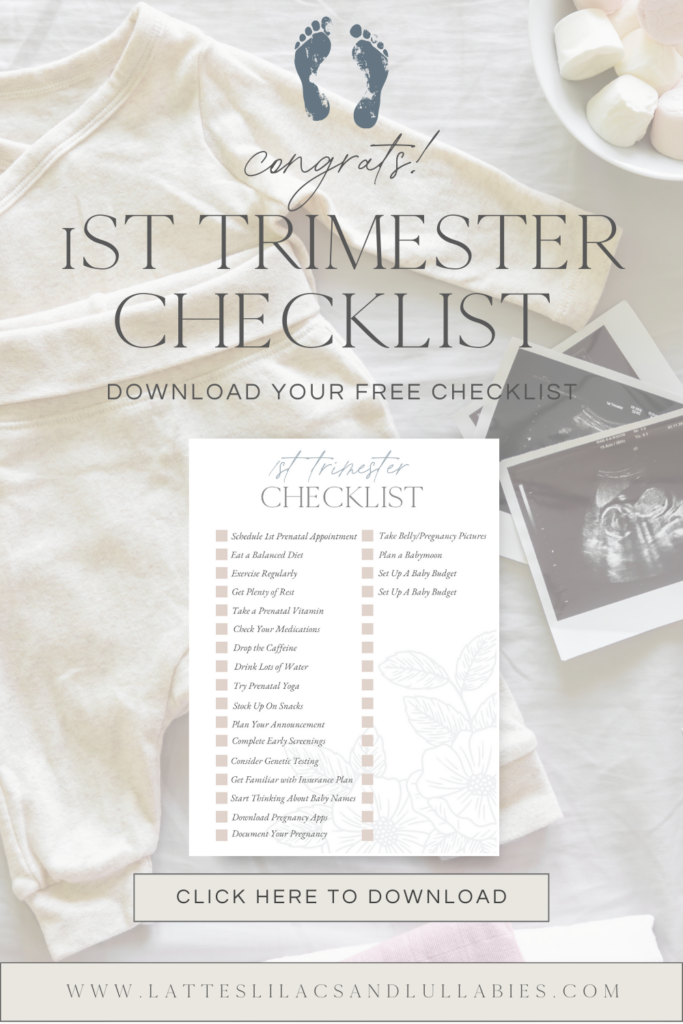
What Not To Do In The First Trimester of Pregnancy
While there are many things you should do during the first trimester of pregnancy, there are also a few things you should avoid. Some of the most important things to keep in mind are…
Avoid Raw or Undercooked Meat
When you’re pregnant, everything changes. Some things for the better, like your skin suddenly has this amazing pregnancy glow. Other things, like your favorite jeans no longer fitting, not so much. But one of the biggest changes is what you can and cannot eat during pregnancy, especially during that all-important first trimester.
The reason why you have to be so careful during this time is that the food you eat can directly impact the health of your developing baby. So, while chowing down on a rare steak might sound appetizing, it’s actually a big no-no during pregnancy.
The same goes for other raw or undercooked meats, as well as unpasteurized dairy products and juice. Basically, anything that could potentially contain harmful bacteria or parasites should be avoided during pregnancy.
So play it safe and stick to cooked meats and pasteurized beverages until after baby arrives. Trust us, your growing bundle of joy will thank you for it later!
Avoid Drinking Alcohol
While some women may be able to enjoy the occasional glass of wine during pregnancy (check with your doctor first), it is generally advised that women avoid alcohol during the first trimester. This is because alcohol consumption during early pregnancy can lead to fetal alcohol spectrum disorders, a group of conditions that can cause physical, cognitive, and behavioral problems.
So if you’re wondering why it’s important to avoid alcohol during the first trimester of pregnancy, the answer is simple: it’s the best way to protect your child from fetal alcohol spectrum disorders.
Avoid Hot Tubs and Saunas
Pregnancy is a glorious time filled with wonder, joy… and a whole lot of warnings. During the first trimester, expectant mothers are bombarded with a long list of Dos and Don’ts, and at the top of that list is avoiding hot tubs and saunas.
While relaxing in a Jacuzzi might sound like heaven to a pregnant woman who’s dealing with morning sickness and fatigue, there are actually some good reasons to steer clear of the steamy water. Too much heat can be dangerous for both mother and baby, raising the risk of dehydration and overheating.
In addition, hot tubs can contain bacteria that can cause infection, and saunas can trigger early labor. So while it’s tempting to take a break in the sauna during pregnancy, it’s important to resist the urge and wait until after baby is born.
Avoid Herbal Supplements
When you’re pregnant, you’re bombarded with advice from well-meaning family and friends. Some of it is useful, but some of it is downright confusing. One of the most common pieces of advice is to avoid herbal supplements during pregnancy, especially during the first trimester. There are a few reasons for this.
First of all, herbs can contain compounds that can cross the placenta and potentially harm the developing baby. Secondly, herbs can interact with medications that you may be taking during pregnancy, such as folic acid.
Finally, herbal supplements are not regulated by the FDA, so it’s difficult to know if they are safe to take during pregnancy. While there are some exceptions, it’s generally best to err on the side of caution and avoid taking herbal supplements during the first trimester of pregnancy.
Avoid Certain Foods
During the first trimester of pregnancy, it’s important to avoid certain foods that can pose a risk to the developing fetus. These include unpasteurized dairy products, deli meats, and seafood. Raw eggs may also contain harmful bacteria, so it’s best to avoid them as well. caffeine and alcohol should also be avoided, as they can increase the risk of miscarriage.
Additionally, it’s important to eat a healthy diet and get plenty of rest during this crucial time. By making some simple changes to your diet and lifestyle, you can help ensure a healthy pregnancy.
Don’t Smoke
There’s no getting around it: smoking is bad for your health. But when you’re pregnant, it’s even more important to avoid smoking. That’s because smoking can increase the risk of miscarrying, having a low-birthweight baby, or giving birth prematurely.
In fact, quitting smoking is one of the best things you can do for your pregnancy. So if you’re pregnant and looking to quit smoking, now is the time to do it. There’s no better time to kick the habit than when you’re bringing new life into the world. So put down the cigarettes and give yourself and your baby a chance at a healthy future.
Litter Box
Anyone who has ever had a cat knows that cleaning the litter box is not a pleasant task. But for pregnant women, it can be particularly dangerous. That’s because toxoplasmosis, a parasitic infection that can be found in cat feces, can have serious consequences for an unborn baby. The good news is that toxoplasmosis is relatively rare, and there are simple steps that pregnant women can take to avoid it.
For example, it’s important to avoid cleaning the litter box during the first trimester of pregnancy, when the risk of infection is highest. And if possible, it’s also a good idea to have someone else handle the litter box duty altogether. By taking these precautions, pregnant women can help keep themselves and their babies safe from harm.
Printable 1st Trimester To-Do List

The first trimester of pregnancy is an exciting time filled with lots of changes. And while it can be a bit overwhelming at times, it’s also a wonderful time to bond with your baby and start thinking about all the amazing adventures that lie ahead. So make sure to take advantage of all the resources available to you, document your journey, and enjoy every minute of it!
More Posts You’ll Love…
- Ultimate First Trimester Of Pregnancy Checklist
- 40 First Grandchild Pregnancy Announcement Gifts & Ideas
- The Best Push Presents for New Moms
- A Second Trimester To Do List
- When To Start Wearing Maternity Clothes
- When To Have A Baby Shower
- The Best Virtual Baby Shower Games
- Signs That Labor 24-48 Hours Away
- Hospital Bag Checklist 2022- The Ultimate Guide
- When To Start Buying Baby Stuff
- What The Hospital Provides After Birth
- 50+ Pregnancy Announcement Ideas: How To Tell Your Husband You’re Pregnant


